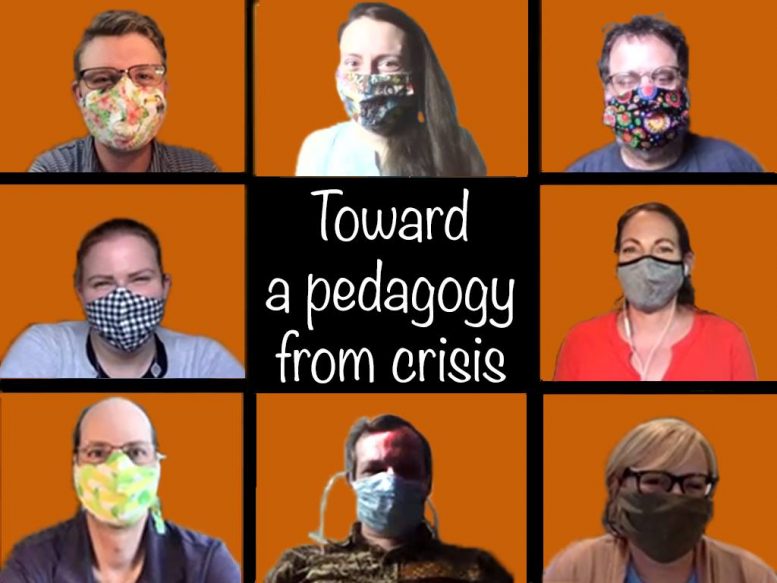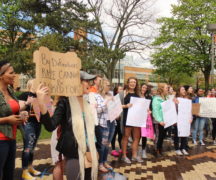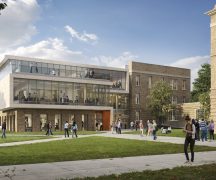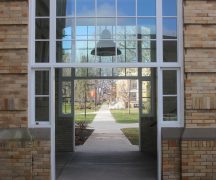By DAVID DUPONT
BG Independent News
Lauren Salisbury, who teaches in the English Department at Bowling Green State University, is a specialist in online teaching.
That’s important work, colleagues will tell her. “We’re all going to have to worry about that someday.” But “that someday is today” Salisbury said. “That someday was March.”
In mid-March as the reality of the coronavirus pandemic set in, the campus moved to online instruction.
“Regardless of where you were with your teaching, you had this huge moment of upheaval,” she said. What she witnessed was faculty members engaged in “crisis or emergency teaching. … It was not what folks wanted it to be. … We just wanted to survive.”
Now Salisbury is part of a team of eight faculty members who are looking at that experience and using it as a way to learn how to improve online teaching.
“This is something that is not going away,” she said. “Lots of students need the online format, students who are parents, students who are caretakers, students who have different accessibility issues. This is a wonderful opportunity to teach these students, and not only to provide them with a stop gap but to provide them with really effective learning opportunities.”
“I don’t know if the future of education is 100 percent online,” said Amílcar Challú, , who chairs the History Department, “but I know it is not 100 percent face to face.”
The project, “Toward a Pedagogy from Crisis, “ received a $273,000 grant from the National Endowment for the Humanities as part of the CARES Act.
Challú and Chad Duffy, in his first year as an assistant professor in the English Department, separately learned about the NEH’s call for submissions and decided to seek some of the money.
Challú was interested in trying to find funds to retain some of the Qualified Ranked Faculty who were facing non-renewal of their contracts. Duffy wanted to study the pedagogical implications of the sudden move to online instruction, and how that could shape teaching at BGSU in the future.
They joined forces at the suggestion of the Office of Sponsored Programs and Research.
They had a week to pull together the application. They had a lot of competition nationwide, Challú said. The server at the NEH couldn’t handle the crush of applications at the deadline.
“Toward a Pedagogy from Crisis” was just one of three grants given to Ohio institutions.
Duffy said it will have three phases.
The first is a “summer camp” directed by Salisbury, Rachel Lee Rickard Rebellino, of the English Department, and Matt Schumann, of the History Department.
During the session which will run from later July until mid-August, when participants will shift into getting ready for the beginning of classes on Aug. 26.
Schumann said they expect 20 participants. The camp will be presented virtually so it can be accessible to as broad a range of people as possible.
“In the summer camp we can help move people out of that state of panic … into a better sense of what’s going on in the fall,” Salisbury said.
“The summer camp is a space to vent,” Duffy said. “This is what the experience was like in the spring and summer and go from there. … What did we learn about teaching in spring and summer and how can that inform our teaching in the future?”
Even that short-term future is uncertain. “The situation is constantly shifting,” Duffy said. “We’re having to constantly stay on our feet in terms of what will happen in fall.”
Schumann, Salisbury and Rebellino are focusing on more than online teaching. All three, Schumann said, have background in reflective teaching.
This encourages teachers to reflect on what they do in the classroom, and what they did well and what needs improvement.
Doing this as a group allows them to compare notes, compile those notes, and share them with their hundreds of colleagues at BGSU and tens of thousands more across the country.
Jolie Sheffer, director of the Institute of the Study of Culture and Society, will produce a podcast on these reflections as part of the BG Ideas series. Sheffler, along with Andy Schocket, professor of History and American Culture Studies, and Lee Nickoson, chair of the English Department, is a member of the advisory board for the project.
Developing research papers out of this process and how it plays out in the fall is another aspect of the grant, Duffy said. “The summer camp a springboard into that research.”
Challú said it looks like three faculty positions were continued at least through fall, and about 20 course sections that had been scheduled to be axed were preserved. That’s also in part, he said, because enrollment seems to be holding up better than expected.
The line between online and face to face instruction is not a bright one.
Challú said though he’s taught face to face, his courses have online components. Students go online to find resources that then play out in in class discussions. When he’s gone to a conference, he’s assigned online reading and then conducted an online discussion based on that material.
This should not come as a surprise to them as researchers. They already collaborate with people around the world.
Schumann said the digital realm means they has access to sources they’d have to travel long distances to find.
Salisbury said scholars have been pursuing this work for a long time. “We have this beautiful wealth of research on what effective online teaching looks like.”
Duffy added: “People who participate in this research and training come to learn online teaching is fun. They can still have a teaching persona. You can make meaningful connections with your students.”
And, he said, students even if they are not in face-to-face classes still “want beautiful connections with professors, and online tools can facilitate that.”





